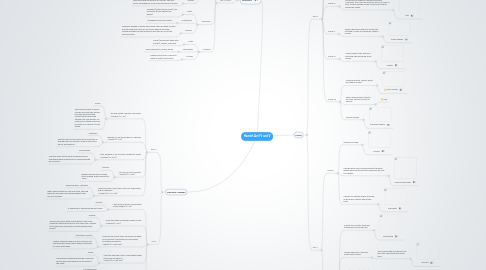
1. Figurative Language
1.1. Act IV
1.1.1. "As level as the cannon to his blank" -Claudius (IV i 42)
1.1.1.1. Simile
1.1.1.2. The King discusses Polonius' murder and how they should proceed with punishing Hamlet while hoping the situation will not worsen. He compares to these chance as accurate as a cannon is to its target.
1.1.2. "Besides, to be demanded of a sponge" -Hamlet (IV ii 12)
1.1.2.1. metaphor
1.1.2.2. Hamlet refers to his friends from university as sponges who are trying to soak up the King's favour and rewards.
1.1.3. "And, England, if my love thou holdest at aught" -Claudius (IV iii 64)
1.1.3.1. Synecdoche
1.1.3.2. Claudius refers to the King of England simply as England when plotting to kill Hamlet through his old friend
1.1.4. "By Gis and Saint Charity" -Ophelia (IV v 58)
1.1.4.1. Allusion
1.1.4.2. Ophelia has become mad and starts singing, while referring to Jesus.
1.1.5. "When sorrows come, they come not single spies, But in battalians" -Claudius (IV v 77-78)
1.1.5.1. Personification, Metaphor
1.1.5.2. When seeing Ophelia in her new state, the King mentions how when bad things happen they occur in bunches.
1.2. Act V
1.2.1. "-they hold up Adam's profession" -Grave-Digger (V i 32)
1.2.1.1. Allusion
1.2.1.2. A reference to the biblical person Adam
1.2.2. "Dost thou think Alexander looked of this" -Hamlet (V i 201)
1.2.2.1. Allusion
1.2.2.2. Hamlet discusses death and wonders if the Great Alexander looked the same as any other man in death (once they were buried and all that remained was bones)
1.2.3. "Now pile your dust upon the quick and dead, Till of this flat a mountain you have made, To overtop old Pelion" -Laertes (V i 258-260)
1.2.3.1. Hyperbole, allusion
1.2.3.2. Laertes expresses how much he cares for his now deceased sister while making references to Greek mythology.
1.2.4. "Your skill shall like a star in the darkest night Stick fiery off indeed." -Hamlet (V ii 256-257)
1.2.4.1. Simile
1.2.4.2. Hamlet tells Laertes that his skill in fencing will become noticeable to all like a star in the night.
1.2.5. "And let the kettle to the trumpet speak" -Claudius (V ii 277)
1.2.5.1. Personification
1.2.5.2. The King is telling everyone that they will drink wine if Hamlet is to win the fencing match.
2. Characters
2.1. Act IV and V
2.1.1. Hamlet
2.1.1.1. Traits
2.1.1.1.1. Loyal to father, clever (show of madness), somewhat rash, curious, obsessive, comtemplative, emotional, loved, articulate
2.1.1.2. Motivations
2.1.1.2.1. To do his duty as a son and avenge his dad
2.1.1.3. Actions
2.1.1.3.1. As of Act IV, Hamlet's actions have mostly been passive aggressive. After his mother dies, Hamlet finally shows his anger and kills Claudius.
2.1.2. Laertes
2.1.2.1. Traits
2.1.2.1.1. Controlled by his emotions, likes to indulge himself, caring brother/son
2.1.2.2. Motivations
2.1.2.2.1. Originally his motivation was fuelled by his own needs, when his father is murdered, he is motivated by the chance of revenge.
2.1.2.3. Actions
2.1.2.3.1. Laertes storms the castle in his homecoming and later plots with the King to kill Hamlet. This plan works somewhat as it does lead to hamlet's murder
2.1.3. Fortinbras
2.1.3.1. Traits
2.1.3.1.1. Obedient (listens to his uncle), also emotional (plans against the Danes)
2.1.3.2. Motivations
2.1.3.2.1. Norwegian pride/ well being
2.1.3.3. Actions
2.1.3.3.1. Originally wanted to attack the Danish after his father's death but later agrees to stop all his actions against Denmark. Fortinbras takes the Danish throne after the fall out of the fencing match.
2.1.4. Claudius
2.1.4.1. Traits
2.1.4.1.1. Clever (almost got away with murder), jealous, impulsive
2.1.4.2. Motivations
2.1.4.2.1. Self preservation, power, greed
2.1.4.3. Actions
2.1.4.3.1. Claudius plots to kill Hamlet in order to protect his throne
3. Events
3.1. Act IV
3.1.1. Scene i
3.1.1.1. The Queen tells Claudius about Polonius' murder who realizes that he could just as easily been Polonius.
3.1.1.1.1. murder
3.1.2. Scene ii
3.1.2.1. Hamlet's friends find him and escort Hamlet to the King
3.1.2.1.1. Crime and Punishment
3.1.3. Scene iii
3.1.3.1. Claudius sends Hamlet to England for his actions and plans on murdering his nephew with the aid of the English.
3.1.3.1.1. England
3.1.4. Scene iv
3.1.4.1. On his way to England, Hamlet encounters Fortinbras' men who are going to war for a small of land. Hamlet realizes he has not done enough to avenge his father.
3.1.4.1.1. War
3.1.5. Scene v
3.1.5.1. Ophelia has gone mad and Laertes has returned in order to avenge his father's murder.
3.1.5.1.1. Crazy Ophelia
3.1.6. Scene vi
3.1.6.1. Hamlet sends news that he is returning after escaping some pirates.
3.1.6.1.1. Pirates
3.1.7. Scene vii
3.1.7.1. Claudius informs Laertes about his father's murder
3.1.7.1.1. Mad Laertes
3.1.7.2. When realizing that Hamlet is still alive, the two plot to kill Hamlet.
3.1.7.2.1. Sad
3.1.7.3. Ophelia drowns
3.1.7.3.1. Drowned Ophelia
3.2. Act V
3.2.1. Scene i
3.2.1.1. Ophelia is buried
3.2.1.1.1. Funeral
3.2.1.2. Hamlet returns and converses with the grave digger about death and later expresses his love for Ophelia
3.2.1.2.1. Hamlet with a skull
3.2.1.3. Hamlet and Laertes argue, the King must remind Laertes about their plans.
3.2.1.3.1. Argument
3.2.2. Scene ii
3.2.2.1. Hamlet tells Horatio what has transpired since he has left
3.2.2.1.1. Storytelling
3.2.2.2. Hamlet agrees to a fencing match with Laertes
3.2.2.2.1. This is where the King hope to kill him with a poisoned sword and drink
3.2.2.3. Hamlet and Laertes both cut each other with the poisoned sword
3.2.2.4. The Queen drinks the poisoned wine and dies
3.2.2.4.1. Gertrude poisoned
3.2.2.5. Hamlet kills Claudius and soon after dies (along with Laertes)
3.2.2.5.1. Hamlet kills Claudius
3.2.2.6. Fortinbras appears in the aftermath and calls Hamlet a hero while claiming the throne for himself.
3.2.2.6.1. King Fortinbras
